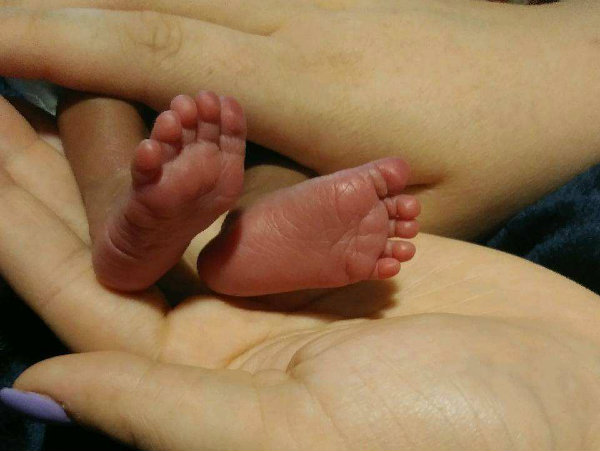 Families and staff celebrate milestones daily in the Small Baby Unit (SBU). Some are small – gaining weight. Others are large – going home.
Families and staff celebrate milestones daily in the Small Baby Unit (SBU). Some are small – gaining weight. Others are large – going home.
Decatur’s Brenda Maulberger said her memories of labor are foggy. She remembers telling nurses “It’s way too early" and “the baby’s not ready.”
Malachi made his entrance – his left foot first with his toes wiggling – at just 23 weeks.
“It was pretty chaotic and unreal. I wasn’t feeling contractions, but my water broke, and he was coming,” said Maulberger, who paramedics rushed to Carle by ambulance.
“I wasn’t really aware of what happens when a baby comes early, but a whole room of people greeted me to take care of both me and my little guy.”
 In its first year, Carle’s SBU welcomed 62 little ones. Eleven of those families gathered to share updates and celebrate.
In its first year, Carle’s SBU welcomed 62 little ones. Eleven of those families gathered to share updates and celebrate.
“Because these babies are so small and critically ill, providing the type of care they need becomes more challenging,” said Derrick Rollo, DO. “We’re ensuring the region’s smallest babies have the best possible start at life with round-the-clock specialized care.”
Neonatal Intensive Care Unit (NICU) nurses provide care and support for parents and babies all hours of the day and night. They play a special role when parents have to return home without their little ones.
“They are touched by an angel. It’s comforting to know you’re leaving your baby with someone who cares as much about them as you do,” Maulberger said. “As a single mom, the transition to caring for him on my own has been challenging. I have a good support system, but Malachi still gives me a run for my money.”
 Carle’s SBU is one of 20 in hospitals across the country dedicated to advanced care for babies born under 30 weeks’ gestation. The special unit in the NICU opened a year ago, providing six beds in a sectioned-off area. This unit minimizes sound and light that impede a baby’s brain development.
Carle’s SBU is one of 20 in hospitals across the country dedicated to advanced care for babies born under 30 weeks’ gestation. The special unit in the NICU opened a year ago, providing six beds in a sectioned-off area. This unit minimizes sound and light that impede a baby’s brain development.
Malachi was tiny – weighing just 1 pound 6 ounces and measuring no longer than the length of his mom’s hand. Meeting him the first time was surreal.
Standing at the foot of his incubator, too scared to look, Maulberger froze. But underneath soft blue lights, donning yellow earmuffs was her perfect son, fighting for his life.
“How is this tiny human going make it?” she asked. Nurses reassured her they were both in good hands. So Maulberger focused on the power of positivity and kangaroo care.
 The goal of kangaroo care is to get baby safely onto Mom or Dad’s chest as soon as possible because skin-to-skin contact between a parent and baby boasts proven benefits.
The goal of kangaroo care is to get baby safely onto Mom or Dad’s chest as soon as possible because skin-to-skin contact between a parent and baby boasts proven benefits.
Maulberger believes.
“Hours and hours in a recliner with Malachi on my chest made all the difference. He only had a 10 percent chance of making it, and now he’s home with just a feeding tube to make sure he’s healthy,” she said.
Categories: Staying Healthy, Redefining Healthcare
Tags: Carle, NICU, innovation, pediatrics, preemie, small baby, NICU nurses, Women's Health
